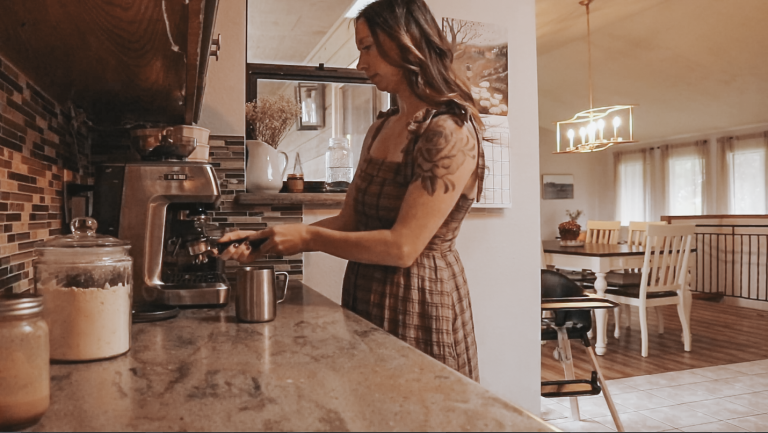You Don’t Have to Be a Cookie-Cutter Housewife to Honor God in Your Home
You don’t have to be a cookie-cutter housewife to honor God in your home.
You don’t have to leave your job or wear a prairie dress to call yourself a homemaker.
But you are called to guard what happens within your walls. To nourish, to disciple, and shape the culture of your home with love, wisdom, and grace.
Maybe you don’t feel like a homemaker because you don’t wear aprons or bake bread from scratch or stay home full time.
Maybe you help pay the bills, don’t like to wear dresses, or you don’t fit the 1950s fantasy of a homemaker.
And at the very same time—maybe you do love all of that. Maybe homemaking, to you, looks like homemade pies, vintage linens, and quiet days at home raising your children. That is beautiful, too – obviously that’s my style and something I’ve embraced.
This isn’t about throwing out the aesthetic. This is about throwing out the lie that you must look a certain way to be doing this well.
If you feel less than because you’ve tried to squeeze your life into someone else’s mold—or maybe you just refuse to fit the mold…
If you’ve been wondering if you’re failing as a homemaker because you don’t look like the influencers you follow…
You can relax—because that whole image of the traditional homemaker is not even traditional.
And it’s not necessarily biblical.
And it’s not what God has called us to preserve.
Dismantling the Myth of the “Traditional Homemaker”
Today we’re going to dismantle the myth of the “traditional homemaker.”
We’re going to trace what God actually says about keeping the home.
We’ll look at the history, the economics, the biblical ideal, and what it really means to be a keeper of the home in our modern world.
This is the exact perspective shift that helped me get honest about our family’s needs, and embrace my calling in a totally new way.
So Many Christian Women Are Burning Out
So many Christian women are burning out under the weight of a homemaking ideal that isn’t even real. They’re doing it all—the job, the chores, the homeschooling, the finances—and still feeling like they’re falling short.
I’ve been there. And what helped me wasn’t more hustle or better time-blocking. It was reframing what God actually says about this role.
The 1950s Fantasy Isn’t Traditional

That housewife image we see in the tradwife trend isn’t even traditional… it’s barely 80 years old.
We think “traditional homemaker” looks like June Cleaver—pearls, lipstick, husband home by 5 with dinner on the table. But that picture didn’t exist before the 1940s.
Before industrialization, most families lived and worked closely together. The home was both the center of life and labor. Men and women’s work was intertwined—farming, crafting, producing goods, raising children, educating, cooking—all part of one home economy.
Women contributed economically through gardening, preserving food, textile work, teaching children, running home-based businesses, and more. Their labor was both domestic and productive for potentially earning money.
The now-familiar model of the husband as sole breadwinner and the wife as full-time domestic manager is not the only biblical vision—it’s a modern invention, shaped more by factories and suburban life than by Scripture.
That specific model—with men commuting to jobs and women staying home, largely detached from economic production—emerged with industrialization in the 19th century and was solidified culturally in the post-WWII era. This was when the suburban ideal took hold and “homemaker” became more isolated from income-generating work.
Just because the 1950s gave us one version of homemaking doesn’t mean it’s the only one—or the most biblical image.
You Can Be a Keeper of the Home Without Being a 1950s Housewife

The command to be a “keeper at home” isn’t a call to reenact the 1950s. It’s a call to something far more enduring and rooted in God’s design.
Titus 2:3–5 gives us the charge clearly:
“Older women likewise are to be reverent in behavior, not slanderers or slaves to much wine. They are to teach what is good, and so train the young women to love their husbands and children, to be self-controlled, pure, working at home, kind, and submissive to their own husbands, that the word of God may not be reviled.”
The phrase “working at home” or “keepers at home” doesn’t mean we’re chained to the kitchen or barred from generating income. It means we guard the home. We prioritize the home. We order the home.
It means we are watchful. We take responsibility. We cultivate and guard the atmosphere, rhythms, and priorities of our home—not because it’s trendy or traditional, but because it’s biblical.
The Proverbs 31 Woman: A Vivid Picture
She’s strong, savvy, and productive:
“She rises while it is yet night and provides food for her household and portions for her maidens.” (Proverbs 31:15)
“She considers a field and buys it; with the fruit of her hands she plants a vineyard.” (Proverbs 31:16)
“She makes linen garments and sells them…” (Proverbs 31:24)
She works hard and wisely. She provides for her family. She makes financial decisions. She contributes to the household economy. And she does it all while keeping her home at the center.
She’s honored because of how she stewards her home—not because she imitates a certain aesthetic, but because she walks in wisdom, strength, and purpose.
Biblical Homemaking Feels Impossible for Many Women

This vision of biblical homemaking is beautiful—but let’s be honest: for many of us, it feels impossible.
We’re carrying more than we were ever meant to—juggling work, motherhood, emotional labor, and in many cases, doing it without the support and “village” we need and while our husbands are far from home.
Maybe you love your family deeply, but you’re overwhelmed. You want to create a peaceful, joy-filled home, but instead you find yourself burnt out, overstimulated, and harboring resentment.
I’ve been there. I was holding all the right convictions, but I was drowning under the weight of them and was becoming a version of myself that was deplorable—until I learned how to approach homemaking differently and how to support my own mind and body. That’s when I found joy and peace in my role without my circumstances changing.
Every Mother is a Working Mother
There’s no such thing as a mom who doesn’t work.
The labels “working mom” and “stay-at-home mom” are misleading and don’t capture the truth: the fact that motherhood demands every part of you—mentally, physically, emotionally, spiritually.
The tasks you do—the diapers, the discipline, the dishes—are important work. They’re also economically valuable. Studies have estimated the unpaid labor of a stay-at-home parent would cost $180,000–$200,000 a year to outsource.
But the real value of a Christian mother and wife isn’t outsourceable. Because you’re shaping souls.
And if you do work, it’s important to make sure your work actually serves your household, rather than sabotage it.
I’m not anti-work. I believe many women are called to create income for their home. But it must support—not compete with—your calling as a keeper of the home.
Ideally, your work should be flexible and aligned with your values.
Because at the heart of biblical homemaking isn’t just productivity.
It’s moral formation.
Moral Formation is the True Priority

Your most important job as a Christian mother and wife is to disciple your children and love your husband.
No career accomplishment can replace the call to shape the hearts and minds of your children.
Raising children to love what is good, to hate what is evil, to walk in truth and grace—that’s your highest calling.
And that takes consistent and sacrificial presence and cannot be outsourced.
This kind of formation doesn’t happen by accident. It takes modeling love, discipline, humility, and faith—again and again.
So while you don’t need to conform to a certain “type” of homemaker to be faithful, you do need to show up with your whole heart.
Because no one else can be the mother God appointed to your children or wife to your husband. This is the one area of your life where you are simply not replaceable.
You are the keeper of the rhythms, the shaper of hearts, and the living example your children will learn from most.
Reclaiming the Proverbs 31 Model

If Proverbs 31 intimidates you, you’re missing the point.
This woman isn’t a superwoman you have to imitate using a checklist—she’s an inspiration for purposeful living.
The Proverbs 31 woman is the most robust picture of biblical womanhood we have. And she’s not passively waiting at home. She’s buying land, selling goods, feeding her family, caring for the poor, and preparing for the future.
She is praised in the gates. Trustworthy. Strong. And all of that stems from her fierce devotion to the good of her household.
You’re Not Too Far Gone
And if you’re a Christian woman who is struggling, maybe you’re stuck in survival mode like I was, it’s not too late.
You can feel calm, present, and in control again. And if you’d like a catalyst for transformation, I’d love for you to join my free workshop using the link below.
It’s always such a joy to have you here. And if you’re wondering how to manage all this when you’re living a life you never asked for—keep going. You are not alone.







